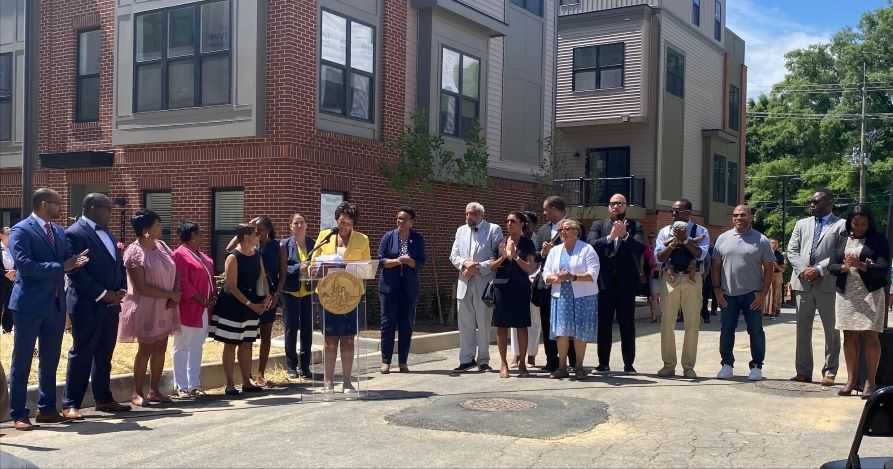Mayor Bowser and Washington, D.C. Government announced on Feb. 15 new initiatives to assist Black Washingtonians with homeownership.
These efforts will spread awareness about current and new resources available to assist Black residents in securing homes, which tend to decrease racial disparities in homeownership and wealth. These new resources included a Black homeownership workshop, which took place on Feb. 18 at Martin Luther King Jr. Memorial Library.
One of the workshop’s resources, Financially Fit DC, offers financial education tools and resources to help maintain daily finances. The workshop’s other resource, the Home Purchase Assistance Program (HPAP), provides interest-free loans and contributes to closing costs to help low-income individuals and families buy homes.
Deputy Mayor for Planning and Economic Development John Falcicchio said it is important to acknowledge the government’s past policies barring Black residents from homeownership while finding ways to reverse previous policies’ discriminatory effects.
“Our goal is the first step in acknowledging the implications of our past and the lasting impact it has on our Black community,” Falcicchio said in the Feb. 15 press release. “By closing the racial gap in homeownership, we are investing in the preservation of the culture and identity of the Black community in Washington D.C.”
D.C. Mayor Muriel Bowser (D) created in June 2022 the Black Homeownership Strike Force (BHSF) — a consortium of government officials, experts and advocates — to address longstanding housing and other financial discrimination in the District and nationally.
Bowser said that increased BHSF programming reflects one step towards the D.C.’s goal to increase Black homeowners.
“We set an important goal: to add 20,000 Black homeowners by 2030,” Mayor Bowser said in a Feb. 15 press release. “Now, we’re focused on making sure residents have the resources and support to find and complete their journey to homeownership.”
“When disparities are created through intentional action and discrimination, we must be just as intentional about reversing those disparities,” Bowser added. “And that is what we are doing with homeownership in D.C. Homeownership is a path to generational wealth, it is stability, and it allows you to bet on yourself, your family, and your future.”
Black homeownership in Washington has decreased as home prices and property values have increased. Black homeowners comprised in 2005 about 46 percent of total D.C. homeowners. As of 2022, the percentage dropped to 34 percent, despite Black individuals making up around 46 percent of all D.C. residents. Over the same time frame, white homeownership in D.C. has increased to about 49 percent.
The impact of historic practices implemented to prevent Black homeownership are felt today, according to the BHSF’s October 2022 report which gave recommendations for increasing Black homeownership in the District.
“The combination of redlining, racial covenants, and discrimination in lending that barred Black residents from the government-backed mortgages available to white families deprived D.C.’s remaining Black households of the economic gain homeownership can bring,” the report read. “These early policies continue to have reverberating effects.”

Redlining originated in the 1930s with discriminatory practices in new government homeownership programs. Government officials used maps to determine who was worthy of new loans and frequently marked predominantly-Black neighborhoods as “too risky” for assistance programs.
The mayor’s push to increase the amount of Black homeowners began with recommendations of the BHSF, which include finding more affordable housing locations, updating zoning and permit processes and streamlining the overall path to homeownership.
Falcicchio said that the resources provided by these new initiatives will have lasting positive and equitable impacts on District families.
“For every family that comes to a workshop and utilizes D.C.’s homeownership tools, that’s one more family that will call D.C. home for decades and will create generational wealth,” Falcicchio said in a statement shared with The Hoya. “What our housing agencies partners are offering is not simply a course and a certificate, but a fair shot and a pathway to the middle class and beyond.”




















